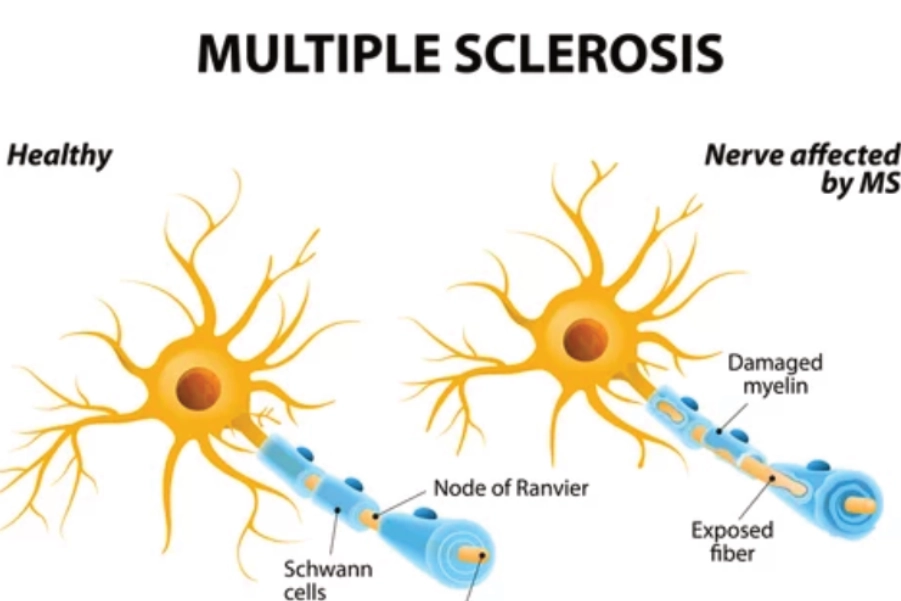Best Physiotherapy for Multiple Sclerosis You Can Trust
Trust “Best Physiotherapy for Multiple Sclerosis” for tailored rehabilitation, integrating evidence-based techniques to maximize recovery and restore independence. Our compassionate care and dedicated support aim to guide people affected by Multiple Sclerosis towards improved mobility and quality of life.
Best Multiple Sclerosis physiotherapy Doctors in Delhi, India

Physiotherapy for Multiple Sclerosis
Multiple Sclerosis Physiotherapy in Delhi
Multiple sclerosis (MS) is a chronic autoimmune disease affecting the central nervous system, characterized by inflammation, demyelination, and damage to nerve fibers. Symptoms vary widely and may include fatigue, weakness, numbness, coordination and balance problems, vision disturbances, and cognitive impairment. Treatment focuses on managing symptoms and slowing disease progression.
What is Multiple Sclerosis
Multiple sclerosis (MS) is a chronic autoimmune disease affecting the central nervous system, characterized by inflammation, demyelination, and damage to nerve fibers. Symptoms vary widely and may include fatigue, weakness, numbness, coordination and balance problems, vision disturbances, and cognitive impairment. Treatment focuses on managing symptoms and slowing disease progression.
Multiple sclerosis (MS) results from a mix of genetic, environmental, and immune factors. Genetics may predispose individuals, while environmental triggers like viral infections can contribute. An autoimmune response leads to inflammation and damage to the protective myelin sheath surrounding nerve fibers in the central nervous system. Factors such as Epstein-Barr virus infections and immune system dysregulation play significant roles. Neurodegenerative processes and hormonal influences also contribute. Although the exact cause remains elusive, understanding these factors helps in managing and treating MS effectively.
Multiple sclerosis (MS) is a complex neurological condition characterized by damage to the myelin sheath, the protective covering of nerve fibers in the central nervous system (CNS). While the exact cause of MS remains unknown, it is believed to result from a combination of genetic, environmental, and immunological factors. Here are some recognized factors that may contribute to the development of multiple sclerosis:
GENETIC FACTORS:
There is evidence to suggest that genetics play a role in predisposing individuals to MS. Although no single gene has been identified as the sole cause of MS, certain genetic variations appear to increase the risk of developing the condition.
AUTOIMMUNE RESPONSE:
MS is considered an autoimmune disease, wherein the body’s immune system mistakenly attacks its own tissues. In the case of MS, immune cells target the myelin sheath surrounding nerve fibers in the CNS, leading to inflammation, demyelination, and damage to nerve cells.
ENVIRONMENTAL TRIGGERS:
Exposure to certain environmental factors may contribute to the development or exacerbation of MS in susceptible individuals. Factors such as viral infections (e.g., Epstein-Barr virus), low vitamin D levels, smoking, and certain dietary factors have been implicated as potential triggers for MS.
INFECTIOUS AGENTS:
Viral infections, particularly those caused by the Epstein-Barr virus (EBV), have been linked to an increased risk of developing MS. Other infectious agents, such as the human herpesvirus 6 (HHV-6) and the bacterium Chlamydia pneumoniae, have also been investigated for their potential role in MS pathogenesis.
IMMUNE SYSTEM DYSREGULATION:
Dysfunction of the immune system, including aberrant activation of immune cells and dysregulation of inflammatory responses, is thought to contribute to the development and progression of MS. Abnormalities in immune cell trafficking, cytokine production, and antigen presentation have been observed in individuals with MS.
NEURODEGENERATIVE PROCESSES:
In addition to immune-mediated damage, neurodegenerative processes involving axonal injury and neuronal loss also contribute to the pathology of MS. Over time, accumulated damage to nerve fibers and neurons can lead to irreversible neurological deficits and disability in individuals with MS.
Multiple sclerosis (MS) results from a mix of genetic, environmental, and immune factors. An autoimmune response leads to inflammation and damage to the protective myelin sheath surrounding nerve fibers in the central nervous system. Factors such as Epstein-Barr virus infections and immune system dysregulation play significant roles. Neurodegenerative processes and hormonal influences also contribute. Although the exact cause remains elusive, understanding these factors helps in managing and treating MS effectively.
Causes of Multiple Sclerosis
GENETIC FACTORS I AUTOIMMUNE RESPONSE I ENVIRONMENTAL TRIGGERS I INFECTIOUS AGENTS I IMMUNE SYSTEM DYSREGULATION I NEURODEGENERATIVE PROCESSES

Treatment of Multiple Sclerosis
Treatment for multiple sclerosis (MS) aims to manage symptoms, slow disease progression, and improve quality of life. Therapies may include disease-modifying medications to reduce relapses and delay disability progression, symptom management medications to address specific symptoms like fatigue, spasticity, or pain, and rehabilitation interventions such as physiotherapy, occupational therapy, and speech therapy to improve function and independence. Additionally, lifestyle modifications, dietary changes, and alternative therapies may also be recommended to support overall health and well-being for individuals with MS.
Physiotherapy Treatment for Multiple Sclerosis
Physiotherapy for multiple sclerosis involves tailored exercises, gait training, and balance interventions to manage symptoms, improve mobility, and enhance overall functional independence and quality of life.
Recent advances in physiotherapy for multiple sclerosis include the use of virtual reality and gaming systems for balance training and motor rehabilitation, as well as the integration of robotics and wearable technology for personalized and targeted interventions to improve mobility and function.
When to Start Physiotherapy After Multiple Sclerosis
Rehabilitation after multiple sclerosis (MS) should commence as soon as possible after diagnosis to address symptoms and maximize functional independence. Early intervention aids in managing symptoms, preventing complications, and optimizing quality of life through tailored exercises, mobility training, and symptom management strategies, improving overall outcomes for individuals with MS.
Physiotherapy & Rehabilitation After Multiple Sclerosis
Multiple sclerosis (MS) rehabilitation typically includes a multidisciplinary approach involving various healthcare professionals. Components may include:
PHYSIOTHERAPY: Tailored exercises to improve strength, balance, and mobility.
OCCUPATIONAL THERAPY: Techniques to enhance activities of daily living and functional independence.
SPEECH THERAPY: Addressing communication and swallowing difficulties.
COGNITIVE REHABILITATION: Strategies to manage cognitive impairments.
ASSISTIVE DEVICES: Recommendations for mobility aids or adaptive equipment.
SYMPTOM MANAGEMENT: Medications and strategies to alleviate symptoms such as spasticity or fatigue.
PSYCHOLOGICAL SUPPORT: Counseling or support groups to address emotional well-being.
LIFESTYLE MODIFICATIONS: Guidance on nutrition, exercise, and stress management.
EDUCATION: Providing information and resources to individuals and their caregivers about MS management and coping strategies.
Our Treatment Process
Committed To Keep People Healthy & Safe
Our treatment process begins with a thorough assessment, followed by the creation of a personalized plan tailored to your needs. Through active rehabilitation, incorporating various evidence-based techniques, we work to promote healing and improve function. Continuous support and guidance are provided to ensure long-term success.
We start by having a thorough conversation with you about your medical history and any issues you’re experiencing. This helps us understand your unique situation.
We use state-of-the-art software and technology to analyze how your body moves and functions. This gives us a detailed picture of what might be causing your discomfort.
Based on what we find during the assessment, we create a personalized plan just for you. Our goal is to help you achieve specific outcomes, whether it’s reducing pain, improving mobility, or something else.
During your sessions with us, we use a combination of advanced technology and hands-on techniques to address your needs. This might include using special equipment or providing manual therapy to target problem areas.
We keep a close eye on how you’re doing throughout your treatment. By regularly checking your progress, we can make sure you’re on the right track and make any necessary adjustments to your plan.
Once you’ve made significant progress and reached your goals, we’ll guide you through a final session. Here, we’ll provide you with a customized digital exercise program that you can continue at home.
Even after your sessions with us are complete, we’re still here to support you. We offer virtual and online follow-up appointments to check in, answer any questions you may have, and provide ongoing guidance as needed.
At Best Physiotherapy Centre in Delhi for Multiple Sclerosis, We Follow Best Practices
Why Choose Us
We offer personalized care, crafting customized treatment plans based on your unique needs and goals. With expertise in physiotherapy and a holistic approach to healing, our team ensures comprehensive care that addresses both physical and emotional aspects of recovery.
- Personalized Care
- Experienced Professionals
- Expertise & Best Practices
- Holistic Approach
- Latest Technology
Meet Dr. Dharam Pandey and Team
Leaders in Advanced Neurological Rehabilitation
At Dr. Dharam Pandey and Team, we are dedicated to revolutionizing Neurological Rehabilitation through cutting-edge technology, personalized care, and a commitment to delivering exceptional outcomes. Led by Dr. Dharam Pandey, a renowned expert in neurorehabilitation, our team is equipped with state-of-the-art facilities and staffed by highly qualified professionals. We specialize in outcome-based functional task training therapy, harnessing the power of advanced technology to optimize recovery for patients.
State-of-the-Art Facilities
Our facilities are equipped with the latest technology and amenities to create a conducive environment for rehabilitation and healing. From spacious therapy gyms to private treatment rooms, we prioritize comfort, safety, and accessibility for our patients.
EXPERTISE
Led by Dr. Dharam Pandey, our team comprises highly skilled professionals with extensive experience in stroke rehabilitation.
PERSONALIZED CARE
We believe in a patient-centered approach, tailoring treatment plans to address the individual needs and goals of each patient.
ADVANCED TECHNOLOGY
We harness the power of advanced technology to deliver innovative rehabilitation solutions and optimize outcomes.
COMPASSIONATE SUPPORT
We provide compassionate, supportive care every step of the way, empowering patients to achieve their full potential.
Best Physiotherapy FOR Multiple Sclerosis
At Dr. Dharam Pandey and Team, we are committed to redefining the standard of care in neurological rehabilitation. With our expertise, state-of-the-art technology, and unwavering dedication to patient-centric care, we strive to inspire hope, restore function, and improve quality of life for head injury survivors. If you or a loved one is seeking specialized rehabilitation services, we invite you to experience the difference at Dr. Dharam Pandey and Team.
Call Today
+91-9818911195 +91-9818910029
Sector-6 Dwarka, Department Of Physiotherapy [Basement 1 Manipal Hospital, Delhi, 110075
Schedule a Appointment
Note: Content provided here is for informational purposes only and is not a substitute for professional medical advice or diagnosis. If you believe you are experiencing pain or any other health-related issue, it is important to seek the advice of qualified healthcare professionals for a proper evaluation and treatment plan.


